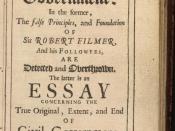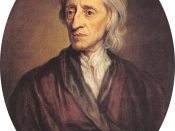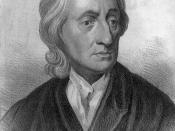John Locke's work about the two treatises of government is essential for the understanding of property and the state of nature. In the second treatise, Locke describes a theory of liberal political government based on the purity of individual property and the state of nature. In Locke's state of nature, no person has any type of control over another but instead natural order governs all people equally. Every individual has the extreme power of the natural law and lives with it. People can do as much as they wish as long as their actions are based upon a universal natural law. Locke argues that individual property must be attained by providing it with labour. Therefore, any type of land which one has donated labour to must become its land. "The labour of his body and the work of his hands" will lead us to obtain individual property and thus have a state with natural reason.
However, Locke lays out the theories of the state of nature and property as two important aspects of people's life when determining order, equality and freedom for all individuals.
In chapter two of the second treatise, Locke tries to explain the state of nature as a state of equality in which no one has power over another. Everyone is free to do as they wish and nobody can tell them what to do. A man will act as a rational being making right choices according to the rule of nature. However, this amount of liberty and independence should not lead to the abuse of others since natural order will still take place. In the state of nature, every person has the power and ability of enforcing natural laws, since these laws are universal. The principal argument in the state of nature is that all people...


